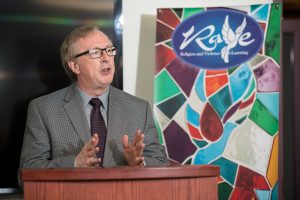






Rob Blanchard Photo UNB
I recently taught the graduate-level course, PACC 7033 The Church’s Response to Domestic Violence, at Acadia Divinity College. With a very diverse group of 18 students, half of them women and half of them men, it was the largest group I have had when teaching the course. As the students grappled with the difficult issues of abuse, the dynamics of power and control in a violent home, the gendered aspects of violence in our society, and the failures of the church to respond appropriately, I was encouraged to see their eagerness to understand at a much deeper level than they had previously understood. They wanted to be prepared to help in an effective way.
For some of the students, almost everything they heard in class was new and not what they had expected. Others shared their own first-hand experiences of abuse. All of them expressed how important they believe it is for theological seminaries to require a course that prepares students well to respond to the needs of victims when they seek emergency help and longer-term pastoral care from clergy. It was especially encouraging when students said that as a result of the class they had learned that what they should do is almost exactly the opposite of that they would have done if they had not taken the course. Though they more fully understood the seriousness of abuse, they also knew that they would be much better prepared to respond when faced with a victim who is in need.
As encouraged as I am by the response of the class, it makes me all the more concerned that most accredited theological seminaries offer little if any training for their students about how to respond to the needs of those who are in abusive relationships. Clergy are often asked for help by victims. The data that the RAVE project has collected from more than 1000 seminary students across North America clearly shows that the reason why too many clergy give inappropriate advice to victims of violence is mainly that they have received very inadequate training about how to respond.
In 2018 in Texas, I was able to present our RAVE research about seminaries to the Theological Seminary Deans’ Colloquy sponsored by the Wabash Center for Teaching and Learning in Theology and Religion, and in 2019 in California I made a presentation to academic deans of seminaries that are accredited by the Association of Theological Schools in the United States and Canada (ATS). By using RAVE research to encourage seminaries to include training about domestic violence in the curriculum, we can help clergy to be effective partners in the community response to domestic violence.
Stephen McMullin, 19 March 2020